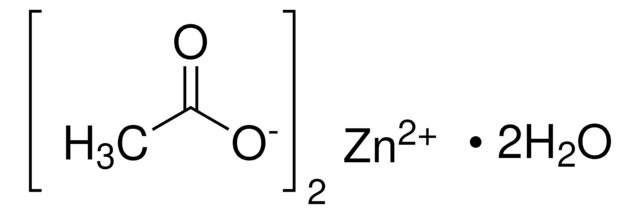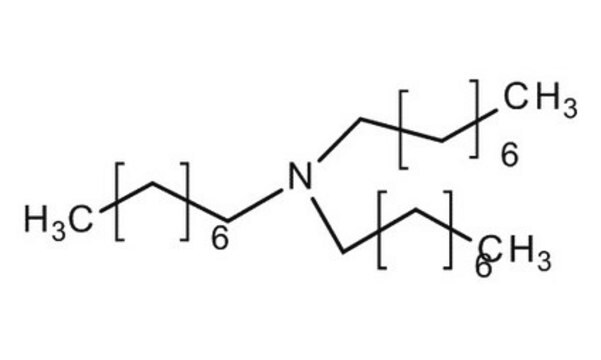379786
Zinc acetate dihydrate
99.999% trace metals basis
Synonym(s):
Dicarbomethoxyzinc, Zinc diacetate
About This Item
Recommended Products
Quality Level
Assay
99.999% trace metals basis
form
powder or chunks
SMILES string
O.O.CC(=O)O[Zn]OC(C)=O
InChI
1S/2C2H4O2.2H2O.Zn/c2*1-2(3)4;;;/h2*1H3,(H,3,4);2*1H2;/q;;;;+2/p-2
InChI key
BEAZKUGSCHFXIQ-UHFFFAOYSA-L
Looking for similar products? Visit Product Comparison Guide
Related Categories
Application
It can be used to prepare solution-processable ZnO semiconductor ink and an inverted staggered type thin film transistor can be fabricated by spin-casting ZnO ink on a Si wafer.
It can also be used to enhance the structural and optical properties of TiO2–ZnO core-shell nanograss by controlling their size and morphology.
Signal Word
Danger
Hazard Statements
Precautionary Statements
Hazard Classifications
Acute Tox. 4 Oral - Aquatic Chronic 2 - Eye Dam. 1
Storage Class Code
11 - Combustible Solids
WGK
WGK 3
Flash Point(F)
Not applicable
Flash Point(C)
Not applicable
Personal Protective Equipment
Choose from one of the most recent versions:
Already Own This Product?
Find documentation for the products that you have recently purchased in the Document Library.
Customers Also Viewed
Articles
One of the more traditional photovoltaic devices, single crystalline silicon solar cells were invented more than 50 years ago, currently make up 94% of the market. Single crystalline silicon solar cells operate on the principle of p-n junctions formed by joining p-type and n-type semiconductors.
Few Monolayer Atomic Layer Deposition (ALD) on Surfaces and Interfaces for Energy Applications
The properties of many devices are limited by the intrinsic properties of the materials that compose them.
Our team of scientists has experience in all areas of research including Life Science, Material Science, Chemical Synthesis, Chromatography, Analytical and many others.
Contact Technical Service











